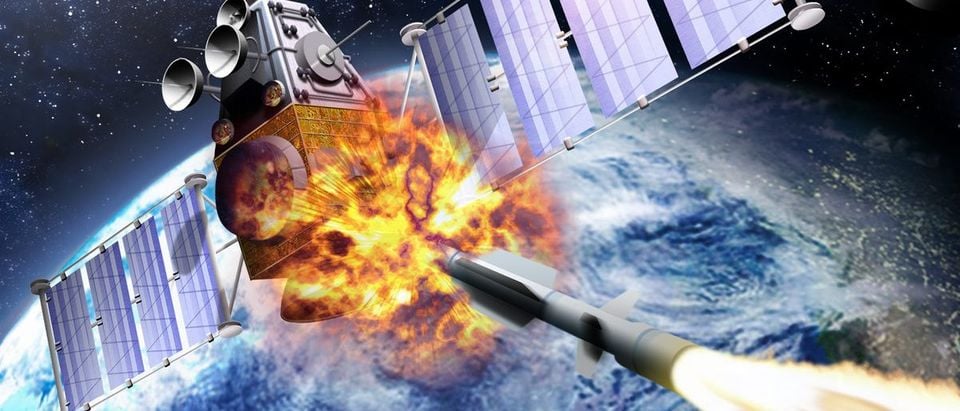Pentagon officials are trying to prevent war in space with Russia and China by creating rules about what will happen when satellites collide or are destroyed.
Department of Defense (DOD) officials suspect both nations are developing space weapons capable of knocking out America’s satellites in any future conflict, giving them a potentially catastrophic edge in war. NatureWorldNews reports this could cause a simple accident in space to trigger an escalation of tensions between the U.S. and either country.
A relatively tiny miscalculation by either side could trigger a dramatic conflict, so the Pentagon now wants to establish rules of conduct. The DOD is also worried space debris created by either Russia or China could make it very hard to operate military satellites.
The critical military importance of satellites has been obscured in recent conflicts because most of them were against guerrilla foes who lacked the ability to target American space assets, according to a report published in August by the U.S. National Academies. America’s military relies on numerous satellites to provide precision navigation, communications, weather monitoring, ground surveillance, spying and detection of nuclear missile launches.
“Despite world interest in avoiding militarization of space, potential adversaries have identified the use of space as an advantage for U.S. military forces, and are actively fielding systems to deny our use of space in a conflict,” Gen. John Hyten, commander of Air Force Space Command, wrote in a white paper published in July. “Securing our right to use space is simply an extension of an age old principle to guarantee use of global commons.”
As a result, the U.S. Air Force has already vowed to invest $6.6 billion into efforts to protect America’s satellites over the next six years, and could spend upwards of $10 billion on space operations from combined public and classified budgets this year, according to The Air Force Times.
The Pentagon suspects that the most rapidly rising threat in space is China’s military-led space program.
China has successfully targeted and destroyed one of its own satellites in orbit in 2007, and has likely tested a ground-based missile launch system to destroy objects in orbit in 2013.
China staged a spacewalk, landed a rover on the Moon, increased its cooperation in space with Europe, and launched a demo space station all since the first manned space launch in 2003. The country launched a total of five crewed flights since 2003 and launched its second space station into orbit earlier this month. The country’s annual space budget is less than the U.S., but most of NASA’s cash is spent on environmental issues and other fields not directly related to space exploration.
China’s space program, however, still currently faces serious problems.
The Chinese lunar rover had numerous mechanical problems and was ultimately abandoned. China’s first attempt to send a satellite into Mars orbit in 2011 failed when the rocket carrying it blew up before reaching Earth’s orbit.
The Obama administration has made some efforts to boost U.S. presence in space, but the White House has directed more funding towards global warming research and less towards space exploration.
NASA only plans one mission to match the Chinese on Mars in 2020, by sending a $2.1 billion dollar nuclear isotope-powered rover to The Red Planet. The U.S. space agency’s astronauts still rely on the Russians to reach space and are being forced to delay its Mars mission until 2030.
Send tips to andrew@
All content created by the Daily Caller News Foundation, an independent and nonpartisan newswire service, is available without charge to any legitimate news publisher that can provide a large audience. All republished articles must include our logo, our reporter’s byline and their DCNF affiliation. For any questions about our guidelines or partnering with us, please contact licensing@dailycallernewsfoundation.org.


